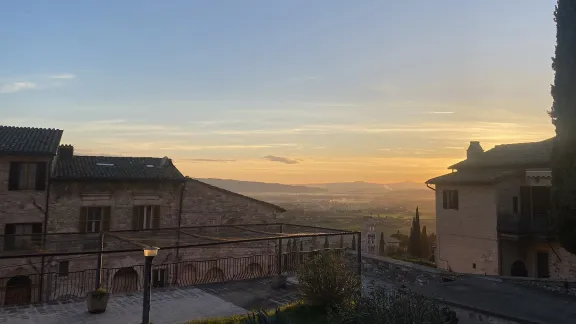A seminar in Assisi asks whether a Feast of Creation could become a pivotal part of the church’s liturgical calendar alongside the celebrations of Christmas and Easter

The setting sun seen from the old town of Assisi where the recent ecumenical seminar on ‘The Feast of Creation’ took place. Photo: Laudato Sì Movement
Reflections on the biblical stories of creation in the context of the growing climate justice movement in the churches
(LWI) - Could the celebration of a ‘Feast of Creation’ become a pivotal point of the liturgical calendar in all the Christian churches? Could that celebration of God’s creation be seen as significant as the other great feasts of Christmas and Easter? Could Christians learn from each other’s traditions to find a clearer understanding of the ties between the biblical account of creation and the current environmental crisis?
Those questions were at the heart of a recent ecumenical seminar held in the Umbrian hill town of Assisi. The 14 to 16 March meeting was organized by the Roman Catholic church’s Laudato Sì Research Institute, in partnership with LWF, the World Council of Churches, the World Methodist Council, the Anglican Communion and the World Communion of Reformed Churches.
Entitled ‘The Feast of Creation and the Mystery of Creation: Ecumenism, Theology, Liturgy and Signs of the Times in Dialogue’, it brought together church leaders, liturgists, scholars, scientists and other experts to explore the history of Christian engagement with the creation story, described in the book of Genesis, in the context of the growing climate justice movement.
Creation, incarnation, cross
Reflecting on the outcomes of this important ecumenical encounter, Assistant General Secretary Prof. Dr Dirk Lange, who represented LWF at the event, said it marked a moment to “dig deeper, together with Catholic, Orthodox and Reformed sisters and brothers, into the ways our churches have developed - or sometimes also failed to foster – a theology of creation.”
Attention to creation, he continued “has been an important component of Lutheran theological and liturgical tradition, but never creation without the cross – or without incarnation.” These three foundations of the Christian faith – creation, incarnation, cross and resurrection - are "the Trinitarian truth that we confess in the Nicene Creed,” he said, recalling Martin Luther’s saying that “the wood of the manger is also the wood of the cross.”
Creation and redemption through incarnation and cross, Lange noted, “are most evident in the sacraments” and also “shaped Luther’s call for the renewal of sacramental life.” By focusing on the material or ‘created’ elements of water, bread and wine used in the Eucharistic liturgy to symbolize the life and death of Jesus, he said, Lutherans are called “to care for the for the waters, the land, the fruits, the air.”
A ‘Feast of Creation’ “may help us find new language and practice to embody the Nicaean insight for the faithful, especially for young people who are particularly attuned to the creation crisis.”
– Prof. Dirk Lange, LWF Assistant General Secretary for Ecumenical Relations
The Orthodox church has an ancient tradition of celebrating 1 September as the day when God created the Earth, a tradition that was revived in recent decades to include both thanksgiving for that gift of creation, as well as prayers for the protection of all of creation. During the seminar, participants reflected on the ways in which the current ecological crisis has forced the churches into thinking and acting in a more intentional manner, not “romanticizing [creation], but rather acknowledging its limits, as well as our own fragility and dependence.”
Many Christian churches worldwide have now begun to mark a Feast of Creation on 1 September, as well as a month-long Season of Creation, which runs until 4 October, the feast day of St Francis of Assisi. A proposal by Dr. Benjamin Stewart, professor at the Lutheran School of Theology in Chicago, to mark the feast on the autumn equinox when the sun’s light falls equally on south and north, sparked interest at the seminar. The official recognition of a Feast of Creation in the liturgical calendar, Lange said, “could offer us the possibility to expand and embody liturgically a Trinitarian theology and spirituality that takes into account a great diversity of approaches.”
Looking ahead to next year’s anniversary of the Council of Nicaea, which defined the Creed that is used by most churches today, Lange noted how a Feast of Creation can help to expand and deepen “our Trinitarian spirituality.” Even more so, he concluded, “it may help us find new language and practice to embody the Nicaean insight for the faithful and especially for young people, who are particularly attuned to the creation crisis and who understand the power of prayer.”


